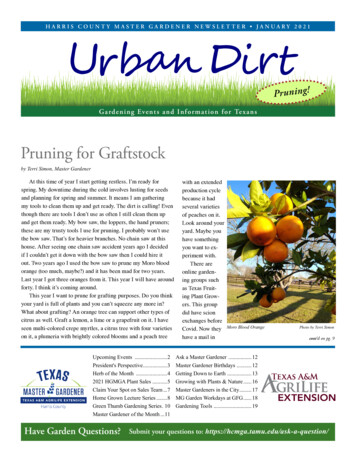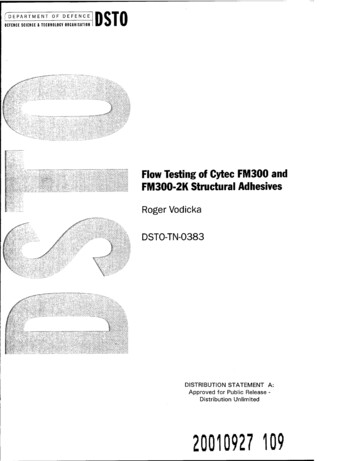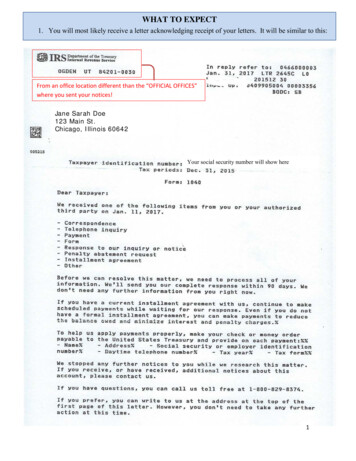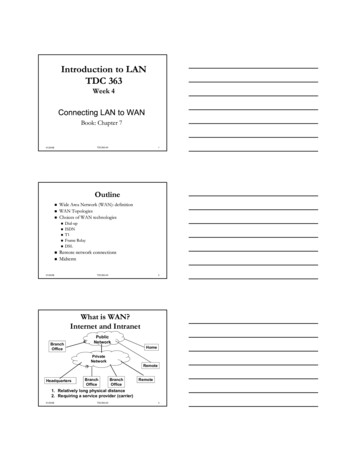
Transcription
HARRIS COUNTY MASTER GARDENER NEWSLETTER JANUARY 2021Urban DirtPruning!Ga rd e n i n g Eve n t s a n d In f o r m a t i o n f o r Te x a n sPruning for Graftstockby Terri Simon, Master GardenerAt this time of year I start getting restless. I’m ready forspring. My downtime during the cold involves lusting for seedsand planning for spring and summer. It means I am gatheringmy tools to clean them up and get ready. The dirt is calling! Eventhough there are tools I don’t use as often I still clean them upand get them ready. My bow saw, the loppers, the hand pruners;these are my trusty tools I use for pruning. I probably won’t usethe bow saw. That’s for heavier branches. No chain saw at thishouse. After seeing one chain saw accident years ago I decidedif I couldn’t get it down with the bow saw then I could hire itout. Two years ago I used the bow saw to prune my Moro bloodorange (too much, maybe?) and it has been mad for two years.Last year I got three oranges from it. This year I will have aroundforty. I think it’s coming around.This year I want to prune for grafting purposes. Do you thinkyour yard is full of plants and you can’t squeeze any more in?What about grafting? An orange tree can support other types ofcitrus as well. Graft a lemon, a lime or a grapefruit on it. I haveseen multi-colored crepe myrtles, a citrus tree with four varietieson it, a plumeria with brightly colored blooms and a peach treeUpcoming Events .2President's Perspective.3Herb of the Month .42021 HGMGA Plant Sales .5Claim Your Spot on Sales Team.7Home Grown Lecture Series.8Green Thumb Gardening Series. 10Master Gardener of the Month.11Have Garden Questions?with an extendedproduction cyclebecause it hadseveral varietiesof peaches on it.Look around youryard. Maybe youhave somethingyou want to experiment with.There areonline gardening groups suchas Texas Fruiting Plant Growers. This groupdid have scionexchanges beforeCovid. Now theyhave a mail inMoro Blood OrangePhoto by Terri Simoncont’d on pg. 9Ask a Master Gardener . 12Master Gardener Birthdays . 12Getting Down to Earth . 13Growing with Plants & Nature. 16Master Gardeners in the City. 17MG Garden Workdays at GFG. 18Gardening Tools . 19Submit your questions to: https://hcmga.tamu.edu/ask-a-question/
URBAN DIRT JANUARY 2021Upcoming EventsJanuary 2021Green Thumb Gardening SeriesWe have collaborated with the Harris County Public Library and Houston Community College.Join us for one or both!Pruning BasicsJan. 11, 10:00 - 11:30 a.m. For HCC program, register in advance to receive the link:hccs.edu/community-learning-workshopsJan. 19, 11:00 a.m. - 12:00 p.m. Simply visit the Harris County Public Library SystemNo reservation required. Watch on Facebook – facebook.com/harriscountypl/liveTexas AgriLife Extension ServiceHorticulture Program in Harris County13105 Northwest Freeway, Suite 1000Houston, TX 77040713.274.0950Master Gardener Program CoordinatorBrandi Keller - 713-274-0956CEA – HorticulturePaul Winski - 713-274-0981Educational ProgramsHome Grown Lecture Series - This webinar is provided by our Harris CountyAg/Natural Resources Department. Registration is required for these free events. Please visit:please visit: homegrown2021Q1.eventbrite.com/Jan. 7, 10:00 a.m. - Pollinator Gardens by Paul Winski, Texas A&M AgriLife CountyExtension Agent-HorticultureJan. 21, 10:00 a.m. - Soil Testing by Shannon Dietz, Texas A&M AgriLife County ExtensionAgent-Agriculture & Natural ResourcesGardening on the Gulf Coast - Webinar To register for these free events, please visit:gardeningonthe gulf.eventbrite.comJan. 6, 10:00 a.m. - Growing Great Transplants by Skip Richter, AgriLife ExtensionHorticulture Agent in Brazos CountyoilJan. 20, 10:00 a.m. - House Plant Maintenance and Identification by Paul Winski, AgriLifeExtension Horticulture Agent in Harris County Amenre Agent in Brazoria CountyYouth ActivitiesGrowing with Plants & NaturePlease visit us on our Growing with Plants and Nature Virtual Group found at thefollowing link: https://www.facebook.com/groups/GPNVG/.Jan. 19, 10:00 a.m. - Winter Gardening by Candy Friday and Julee JacksonFor information about upcoming topics, dates, and registration, please email us atogd.harrishort@gmail.com. Registration is required before each Family Zoom Event.Fruit Tree Plant Sale!Currently ongoing at our Online Store at: http://hcmga.tamu.eduOrder online now, pick up January 23 at Richard & Meg WeekleyPark in Cypress and February 20 at Pasadena Fairgrounds.Please visit us at the social media pages below: Harris County Extension Horticulture Facebook Page Harris County Master Gardeners Facebook Page Harris County Family and Community Health Facebook PageFor more information on COVID-19, please visit the following websites:2COVID-19AgriLife ExtensionWeb Hub2021 Board of DirectorsPresidentAlan Fishermanhcmgapresident@gmail.comFirst Vice PresidentJonathan Correiahcmga1vp@gmail.comSecond Vice PresidentCarolyn Boydhcmga2vp@gmail.comPast PresidentBeth Braunhcmgapastpres@gmail.comSecretaryLinda Saxmanhcmgasecretary@gmail.comTreasurerKathryn McCleodhcmgatreasurer@gmail.comDirectorsDouglas McLeodDianne LawrenceJanice MuhmDale HudsonAlexa HaassCarlos DomenechGenoa Friendship GardensSteering Committee AdvisorsEvan HopkinsGeorgia Lau Urban Dirt EditorCarolyn BoydUrbanDirt.harrishort@gmail.comAssistant Urban Dirt EditorTerri Simon
URBAN DIRT JANUARY 2021President’s PerspectiveWelcome to a new year of the Harris County Master GardenerAssociation. Unfortunately, we are still wearing masks and socialdistancing. Hopefully, we will be meeting in person soon. Untilthen, we will meet virtually via Zoom on the first Tuesday of themonth. The Weekly Update prior to the meeting will have theZoom link information.With the help of many master gardeners and especiallyJonathan Correia, our online fruit tree sale is up and running.More publicity is always needed and all of us can help. Spread theword about the tree sale to all your friends and put it on your localNextdoor (I have Nextdoor Meyerland). You can view all that isavailable at HCMGA-online.company.siteEven though we can’t meet in person, there is plenty that youcan do to earn your hours. There is lot to do in the gardens atGFG, as well as, Centennial Gardens.CONGRATULATIONS to the Class of Summer 2019graduates! And, the 2021 Board and Officers have been voted in.We are all looking forward to continued work to makeHCMGA better and better.2021 HCMGA Board and OfficersPresident . . . . . . . . . . . . . . . . . . . . . . . Alan Fisherman1st Vice President. . . . . . . . . . . . . . . . Jonathan Corriea2nd Vice President . . . . . . . . . . . . . . . . . . Carolyn BoydPast President. . . . . . . . . . . . . . . . . . . . . . . . Beth BraunSecretary. . . . . . . . . . . . . . . . . . . . . . . . . Linda SaxmanTreasurer. . . . . . . . . . . . . . . . . . . . . . . Kathryn McLeodDirector #1 . . . . . . . . . . . . . . . . . . . . . Douglas McLeodDirector #2 . . . . . . . . . . . . . . . . . . . . . Dianne LawrenceDirector #3 . . . . . . . . . . . . . . . . . . . . . . . . . Janice MunnDirector #4. . . . . . . . . . . . . . . . . . . . . . . . Dale HudsonDirector #5 . . . . . . . . . . . . . . . . . . . . . . . . . Alexa HaassDirector #6. . . . . . . . . . . . . . . . . . . . Carlos DomenechAlan FishermanHCMGA Board President, 20212021 Green Thumb Gardening LectureSeries Scheduleby Brandi Keller, Harris County Master Gardener Program CoordinatorWe are pleased to announce that our Green Thumb LectureSeries will also be available through our collaboration withHouston Community College (HCC) via a monthly webinar. Thislecture will be slightly longer than the Facebook Live version, butit will not be available for later viewing. Registration is requiredthrough HCC’s Community Learning Program, but it can be madefor talks from January through May at the same time.January’s topic will be Pruning Basics, by Master Gardener,Becky Larkin. For a list of the year’s topics, links to FacebookLive and HCC registration, please visit our Harris County MasterGardener Website. Many thanks to the Harris County PublicLibrary System and HCC for a new year of collaborations.Before the pandemic, Harris County Master Gardeners hostedfour in-person lectures at four different Harris County PublicLibraries each month, January through October. In June, weadapted to the circumstances and provided our first online talkwith the Library System. Each month since, on the third Tuesday, we have hosted our monthly lecture through the Library viaFacebook Live. This allowed it to be streamed to all 26 libraries,increasing the availability to more community members. Wewill continue to host the lecture once a month with the LibrarySystem. Facebook Live not only allows for a dynamic interactionwith attendees, but it saves as a post so that it can be viewed at alater time. Search videos on our Harris County Master GardenerFacebook Page or the Harris County Public Library Page underthe category for “Videos.”3
URBAN DIRT JANUARY 2021Herb of the MonthCandyleaf (Stevia rebaudiana)by Karen McGowan, Master GardenerSpring boarding from last month’s herb focus, the toothache plant (sugar-plums and all that), let’s keep the sweet vibesflowing into 2021 with this year’s first herb article and put apre-Valentine’s Day focus on a sweetheart of the herb garden,candyleaf.Also known as stevia and sweetleaf (derivatives of steviarebaundiana are readily brand-identified, typically available onthe baking is a tenderperennialwithinCandyleaf (Stevia rebaudiana)the asterfamily, and is native to warm, humid climates in South America.As such, local growers find frequent success with candyleaf.Reaching a height and width of about one foot each, candyleaf’stubular white flowers are often kept pruned in order to improvethe taste of its edible leaves, for which the herb is grown.Candyleaf is perfect for sunny to partially sunny locationswith either sandy or loamy soil, and is best grown in moderatelymoist soil, provided good drainage is offered. Propagation byseed can be quite challenging, so stem cuttings are the best betfor success. Since candyleaf is tender, cuttings should be introduced to the garden after the last frost. Candyleaf is pollinatedby insects.While the FDA didn’t approve candyleaf’s use as a sweetenerhere in the United States until 2008 due to stated carcinogenicconcerns, Japanese researchers developed a commerciallyavailable product using candyleaf’s leaves in the 1970s, andthe product quickly gained widespread popularity nearly fiftyyears ago in Japan. The European Union approved candyleaf’suse as a sweetener even later than did the U.S., in 2011. But theoriginal documented users of candyleaf, the Guaraní, a SouthAmerican Indian group of nearly five million people residingmainly in Paraguay, have known about and been using the herbsince around the time of Arthur’s legendary victory over theSaxons, in 500 AD.This versatile, natural sweetener’s leaves contain sweettasting chemicals known as steviol glycosides, which can beused either fresh or dried to sweeten beverages or desserts. Theleaves can also be commercially processed into both liquid andpowdered non-caloric sweeteners. Steviol glycosides, particularly the chemicals stevioside and rebaudioside A, can be morethan 300 times sweeter than table sugar and are non-glycemic(they do not affect blood glucose levels). How sweet is that?!To this chef’s personal perspective, I have used several sugarsubstitutes in various dishes, including those derived fromcandyleaf. Aside from a slight resistance of its powder form towell-incorporated blending – which can be easily overcome witha high-speed blender (I use a Vitamix) – my experience withit has been very positive across the board. I especially endorsetapping it when a sweet factor is called for in savory dishes,particularly in Asian and Asian-fusion cooking.Here’s to a sweet new year – happy nname Stevia rebaudiana4
URBAN DIRT JANUARY 20212021 Harris County Master GardenerAssociation Online Plant Salesby Jonathan Correia, Master GardenerShop the safe and easy way—online!Who:Harris County Master Gardener AssociationWhat: 2021 Fruit Tree SalesWhen: Order online now, pick up January 23 at Richard & Meg Weekley Park in Cypress and February 20 at Pasadena FairgroundsWhere: Online Store at http://hcmga.tamu.eduWhy:HCMGA raises funds to provide factual and relevant horticulture information to the publicChoosing your plantWhether you’re an experienced or novice fruit tree grower,here are a few points to keep in mind.For proper plant growth and fruit production, make sure youhave a location that gets at least six hours of sun exposure duringthe growing season.Is your choice self-fertile or will it need a pollinatingbuddy? Refer to the online catalog at Final.pdf for pollinating requirements as well as chill hour requirements. Several popular choiceslike apples and blueberries need a pollinating buddy. Check outwhether the buddy needs to be the same variety or a differentvariety.The online Store at https://hcmga.tamu.edu has photos andinformation on all available plants.A fruit tree/plant from Harris County Master Gardeners willcost between 20- 55. Transplanting costs include soils, compost,mulch, irrigation, and a large planter if it will be container grown.Master Gardener plant sales offer varieties that thrive andproduce well in our area. Careful attention is paid to suitable chillhours, hardiness, disease and insect resistance, and fruit quality.Included are more than 100 varieties of fruiting plants: apples,avocados, berries, coffee, figs, goji berries, lemons, limes, oranges,mandarins, mulberries, nectarines, peaches, pears, persimmons,plums, pomegranates, tangerines and more.Harris County Master Gardener Association is a nonprofit,501(c)3 incorporated association affiliated with the TexasAgriLife Extension Service in Harris County and the Texas A&MSystem.Pick Up DayFor your safety and convenience, you will be assigned a halfhour window to pick up your plants at the location you’ve selected. We ask that you have your vehicle ready for the plants andother purchases to be loaded for you while you wait in your car.Choosing, planting, and caring for a fruiting plantGardening with fruits has been a popular activity for generations, but there is a noticeable surge of interest in edible landscaping. Fruit trees and citrus especially are a large part of ediblelandscapes in the greater Houston area.Not only will you enjoy homegrown flavor, but fruit trees alsooffer beauty in flowers, form, and fragrance. There are fruit treesto suit any landscape, whether a large tree like a pecan, a potteddwarf Meyer lemon for your patio, or a pear, apple, or fig tree toespalier against a wall. Fruit trees can easily be incorporated intopermaculture, the simulation of natural ecosystems intended to besustainable and self-sufficient.Caring for your plant before plantingAll our fruit trees will be in 3-gallon containers with plentyof compost, mulched soil and slow release fertilizer. Fruit treesare best planted in mid-winter to allow the roots to develop beforespring growth and summer heat arrive. With watering and protection from wind and cold temperatures, the plant can be kept inits container for several months before transplanting. Citrus andavocados can wait until March or April to be planted.Preparing the planting areaSelect a planting location that will get at least six hours ofsun per day during the growing season. The sun should not becont’d on pg. 65
URBAN DIRT JANUARY 20212021 Harris County Master Gardener Association Online Plant Sales, cont'd from pg. 5blocked by buildings, fences, or other obstacles. Choose a spot atleast three feet from sidewalks and driveways and eight feet awayfrom buildings, as roots will spread wider than the tree crown.Allow 10-15 feet between fruit trees.A few months before planting, prepare the site by removingthe sod and weeds, roots and all, and thoroughly tilling an area atleast 4 feet by 4 feet. Break up any hard pan layer beneath the soil.Level the site, and till again. Spread several inches of compost tothe area and work it into the top 8-12 inches of soil. Rake the areasmooth and mulch it with 2-3 inches of organic mulch such asleaves, old hay, or composted native mulch. Do not add fertilizers;your new fruits won't need them at first. Let the bed rest untiltime to plant. If you plan to espalier the fruit against a wall orfence, clean the surface and ground of vines and their roots.and bottom of the root ball to encourage the roots to grow outward. Prune off any broken, rotted, or twisted roots, making cleancuts with sharp, sanitized pruning shears. Position the plant in thehole, spread the roots, and stand back to make sure it’s uprightfrom all angles and is pleasing in its setting. Refill the hole withthe original soil, tamping the soil gently around the roots as yougo.Water well to settle the soil around the roots and remove airpockets. If planting in fast-draining soil, water thoroughly to finish settling the soil around the roots. In slower-draining soils, water a little at a time – over several days if necessary. Then make adonut-shaped ridge of mulch 3-4 inches high and 6-8 inches widearound the plant, keeping the mulch 2-3 inches away from thetrunk. The ring should be slightly wider than the planting hole.Stand back again to admire your work.PlantingRake the mulch back and dig a hole three times the width ofthe container, about 30-36 inches, and loosen the sides of the hole.Roots do not readily penetrate a slick interface created by claysoil.Dig the hole a little deeper than the root is tall, and make itwide enough to accommodate the longest roots without bending.Backfill the bottom of the hole with the soil you dug out so thatthe root collar—where the stem meets the root ball—is slightlyabove the ground when it’s planted. Loosen the roots on the sidesCaring for your young fruiting plantFor the first year after your new fruit tree is planted, concentrate on the health of the tree rather than getting a crop. Pinch offthe fruit during the first year to encourage root growth. You willneed to protect your plant from high winds, extreme temperatures, and over or under watering. Keep weeds and lawn frominvading the planting area. Monitor your plant regularly for anysigns of nutrition loss, fungal or bacterial diseases and non-beneficial insects.6
URBAN DIRT JANUARY 2021Claim Your Spot on the Plant Sales Teams!by Jonathan Correia, Master GardenerThere’s nothing quite like the buzz at Master Gardener plantsales. These fundraising events make our mission of public education and outreach possible. Miss the camaraderie of workingwith fellow MG’s? Here’s your chance to engage. Whether you’renew to the program or a veteran volunteer, there is a place foryou. Work has already started on the four 2021 plant sales:THE TOP PRIORITY NOW is to add volunteers to thecatalog team. Click HERE to see open positions, and HERE fordetailed descriptions of each position. Claim your spot and getstarted by emailing PlantSales.HarrisHort@gmail.com. We arecounting on you!January 23 – West Side Fruit Tree Sale Pickup in CypressFebruary 20 – Genoa Friendship Garden’s Fruit Tree &Tomato Sale Pickup in PasadenaMarch 13 – West Side Spring Vegetable & Perennial SalePickup in CypressMarch 20 – Genoa Friendship Garden’s Pepper, Perennial &Herb Sale Pickup at Genoa Friendship Gardens7
URBAN DIRT 8JANUARY 2021
URBAN DIRT JANUARY 2021Pruning for Graftstock,
Registration is required through HCC’s Community Learning Program, but it can be made for talks from January through May at the same time. January’s topic will be Pruning Basics, by Master Gardener, Becky Larkin. For a list of the year’s topics, links to Facebook Live and HCC registration











